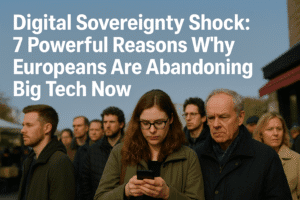Digital Sovereignty Shock: 7 Powerful Reasons Why Europeans Are Abandoning Big Tech Now
Spurred by geopolitical unease under Trump’s renewed presidency—marked by US isolationism, trade wars, and tech leaders’ political alignment—Europeans are actively seeking digital independence. Grassroots movements, like Berlin’s Topio stall helping purge US tech from phones, reveal a shift from privacy advocates to politically conscious citizens. Data shows surging interest in European alternatives: Ecosia searches rose 27%, ProtonMail usage grew 12%, and Signal installations climbed 7%, reflecting a quest for “digital sovereignty”—control over data, infrastructure, and economic security.
Governments are responding (e.g., Germany mandating open-source software), but deep dependencies on US tech ecosystems pose challenges. Core internet functions, hidden infrastructure ties, and market dominance make full separation unlikely. Yet, this awakening signals a pivotal societal shift: Europeans now view digital autonomy as inseparable from strategic resilience, blending consumer action, policy, and a redefinition of trust in an unstable world.

The line snakes around the Berlin market stall, a quiet rebellion unfolding one smartphone at a time. At Topio, a volunteer charity, the mission is digital detox – specifically, purging devices from the pervasive influence of US tech giants. “Since the inauguration, the queue has grown,” observes founder Michael Wirths. “Before, it was data privacy experts. Now, it’s politically aware citizens feeling exposed.” This Berlin microcosm reflects a seismic shift rippling across Europe: a determined quest for digital sovereignty catalyzed by profound geopolitical unease.
The Geopolitical Spark:
Donald Trump’s return to the White House wasn’t met with transatlantic fanfare, but with palpable anxiety. Signals of US withdrawal from European security, the launch of trade wars, and inflammatory rhetoric from key allies like VP JD Vance (accusing Europe of censorship) and Secretary of State Marco Rubio (threatening visa bans over content moderation) have shattered old certainties. The prominent presence of tech titans like Musk, Bezos, and Zuckerberg at Trump’s inauguration further cemented a perception: US tech power and an increasingly isolationist US government are intertwined.
The Grassroots Response:
Data from Similarweb paints a clear picture of changing user behaviour:
- Search Shifts: Berlin-based Ecosia, planting trees with its profits, saw EU queries surge 27% year-on-year. Founder Christian Kroll notes wryly, “The worse it gets, the better it is for us.” While still dwarfed by Google’s billions, the trend is undeniable.
- Email Exodus: Swiss privacy-focused ProtonMail saw European usage jump nearly 12% (YoY to March), while Gmail use dipped slightly. ProtonMail confirms a post-election European user increase.
- Messaging Moves: Encrypted app Signal experienced a 7% month-on-month surge in EU usage in March, while Meta’s WhatsApp stagnated.
- Communities Form: Online spaces like the 211,000-member Reddit group “BuyFromEU” buzz with recommendations and migration stories (“Just cancelled Dropbox for Proton Drive!”).
Beyond Privacy: The Sovereignty Imperative:
This movement transcends traditional privacy concerns. It’s driven by a fundamental question: Can Europe control its digital destiny if its critical infrastructure, communication, and data reside within ecosystems beholden to a politically volatile ally?
Experts highlight tangible risks:
- Legal Reach: US law permits device searches at borders and compels US-based providers (like cloud services) to hand over data on non-US citizens, even if stored abroad (Greg Nojeim, Center for Democracy & Technology).
- Platform Power: Reliance on US platforms makes Europe vulnerable to unilateral policy shifts, content moderation disputes (like Meta’s claims that the EU’s Digital Services Act is “censorship”), and potential service disruptions.
- Economic Dependence: Alphabet’s $100 billion EMEA revenue underscores Europe’s role as a profit center funding US innovation, often stifling homegrown alternatives.
Policy Meets Practice:
Governments are responding:
- Germany’s coalition agreement prioritizes open-source formats and local cloud infrastructure.
- Schleswig-Holstein mandates open-source software for all public administration IT.
- Berlin funded Ukraine’s switch from Starlink to France’s Eutelsat satellite network.
- The EU’s Digital Services Act, despite US tech protests, aims to enforce accountability for illegal content.
The Reality Check: Can the Tide Turn?
Despite the momentum, the challenge is Herculean:
- Entrenched Ecosystems: Bill Budington (EFF) notes that core internet infrastructure – push notifications, content delivery networks (CDNs), traffic routing – relies heavily on US companies. “Completely divorcing US tech… is possibly not possible.”
- Hidden Dependencies: Ecosia and France’s Qwant often rely on Bing or Google for underlying search results. Many alternatives use cloud infrastructure owned by the giants they seek to replace.
- Market Dominance: Google commands ~70% of global email and near-total search dominance. Alternatives like Mastodon remain niche despite periodic surges.
The Path Forward: Awareness Fuels Demand, Regulation Builds Leverage
While mass migration away from US tech giants remains unlikely short-term, the shift is profound:
- Mainstream Awakening: “Ordinary people… are saying, ‘hang on!'” notes internet regulation expert Maria Farrell. “My hairdresser was asking me what she should switch to.” Political awareness is driving action where pure privacy arguments sometimes failed.
- Foundations for Alternatives: Increased demand provides vital oxygen for European and privacy-focused services, allowing them to scale and innovate.
- Regulatory Imperative: As digital rights activist Robin Berjon argues, “The market is too captured… Regulation is needed as well.” Grassroots pressure strengthens the EU’s hand in enforcing digital sovereignty through policy.
The Insight:
Europe’s digital sovereignty push isn’t just a policy goal or a privacy fad; it’s a burgeoning societal response to geopolitical realignment. It reflects a dawning realization that digital dependence is strategic dependence. While unplugging entirely from the US digital ecosystem is currently impossible, the surge in demand for alternatives and supportive policy moves signals a crucial fragmentation of trust. This is the birth of a more conscious, politically-aware European digital citizenry – one actively seeking to rewire its connections, not just for privacy, but for fundamental autonomy in an increasingly unstable world. The Berlin queue is more than a line; it’s the leading edge of a continent rewiring its future.
You must be logged in to post a comment.